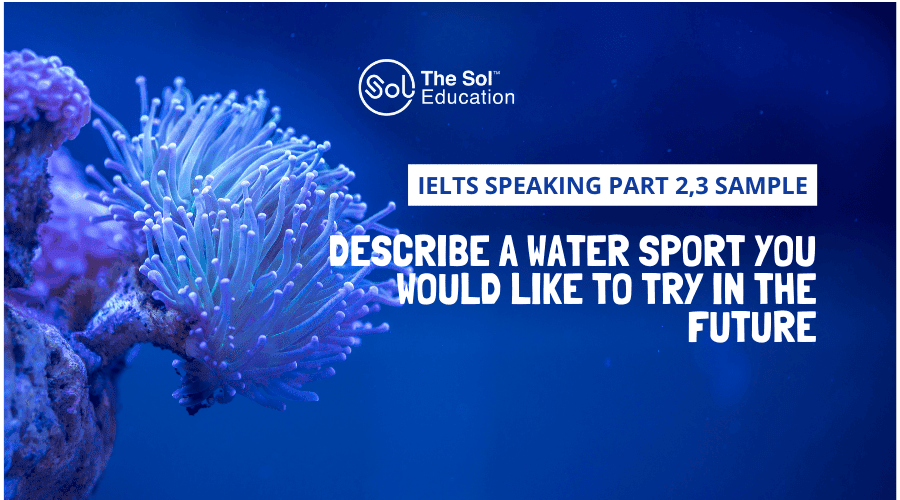Bạn đã từng thử một trò chơi nào dưới nước chưa? Bạn có muốn thử trong tương lai không? Hãy cùng SOL tham khảo câu trả lời mẫu cũng như các từ vựng hữu ích cho đề bài IELTS Speaking part 2, part 3 này nhé.

Describe a water sport you would like to try in the future
You should say:
A water sport that I would really like to try is jet-skiing. I’ve seen it on TV and I’ve seen people do it in Danang at sea, but I’ve never had the chance to do it myself.
A jet-ski is a kind of a motorized machine that you sit on – it has a seat, and handlebars like a bike, I suppose, and instead of a front wheel it has two skis. The motor is located at the back. When you sit on the jet-ski, and get it started, you basically move quickly across the water, as if you’re in a speedboat, really, and steer the jet-ski, making it go faster by turning the handle on the handlebars, very much like you would on a motorbike. I
t looks really really fun, and people say it’s not so hard. At least it seems easier than surfboarding, and it’s really fast too, or can be when you feel confident enough to go at speed. I’ve seen a lot of people doing it, and it looks so cool how the jet-ski can shoot across the waves even when the sea isn’t very calm. Often you wear a wet-suit or a swimming costume because it’s inevitable that you fall off, at least the first few times you try.
I believe that when you hire a jet-ski, you also get an hour of instruction from a qualified trainer too, so you do learn the basics of how to get it going, how to steer, and what to do when you fall off, and how to get started again. I can’t imagine it’s too hard to get to grips with because I’ve seen quite a few young people and even kids of about 12 years old, doing it. I hope to do it this summer if we go to Danang on holiday – I’m planning a trip there with a bunch of friends, you see.
Well, water sports hold a special place in our culture due to our coastal geography. One of the most popular water sports in my country is swimming. With an extensive coastline and numerous rivers, swimming has become a fundamental skill and a favored recreational activity for many Vietnamese. Beaches and riversides are often bustling with people enjoying swimming, especially during weekends and holidays.
People are naturally drawn to water for various reasons. I can attest to the fact that water provides a sense of tranquility and relaxation. Engaging in activities near water, whether it's swimming, fishing, or simply sitting by a lake, offers a calming effect that helps individuals unwind from the stresses of daily life. Additionally, water environments offer opportunities for social interaction, family bonding, and a connection with nature.
Absolutely, I strongly believe that schools should incorporate swimming lessons into their curriculum. Learning to swim is not only a valuable life skill but also a matter of safety, especially in a country like Vietnam with its abundant water bodies. Teaching students to swim equips them with the ability to navigate water safely, potentially preventing accidents. Furthermore, swimming promotes physical fitness and instills confidence, making it an essential aspect of a well-rounded education.
Yes, there are quite a few schools and facilities that offer swimming lessons in my country. As a Vietnamese, I've observed that both public and private institutions recognize the importance of swimming education. Many schools partner with swimming clubs or facilities to provide students with opportunities to learn this vital skill. However, there might still be room for expansion and improvement, especially in rural areas where access to swimming lessons might be limited.
Absolutely, I firmly believe that everyone should learn to swim. Water-related accidents can happen unexpectedly, and knowing how to swim can make a significant difference in ensuring personal safety. Additionally, swimming is a form of exercise that promotes cardiovascular health and muscle strength. Learning to swim at a young age instills a lifelong skill that can contribute to physical well-being and overall confidence.
Yes, I believe it's important for the government to allocate resources for developing facilities for water sports. I've seen how investing in such facilities can have positive impacts on public health, tourism, and community engagement. Properly maintained swimming pools, waterfront parks, and water sports centers can provide opportunities for physical activity and leisure. They can also attract tourists and contribute to the local economy while promoting a healthy lifestyle among citizens.
Chúc các bạn học IELTS Speaking hiệu quả nhé.
